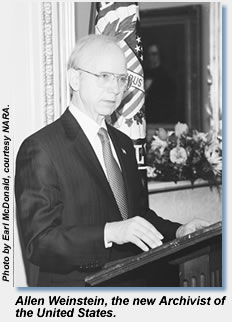News
Allen Weinstein Becomes Ninth Archivist of the United States
 Allen Weinstein, a well-known historian, was sworn in as the ninth Archivist of the United States by Senator Richard Lugar at a special ceremony in the U.S. Capitol on February 16, 2005.
Allen Weinstein, a well-known historian, was sworn in as the ninth Archivist of the United States by Senator Richard Lugar at a special ceremony in the U.S. Capitol on February 16, 2005.
At the swearing-in ceremony, Weinstein said, "In April, we will celebrate the 20th anniversary of National Archives independence. Under National Archivists during both Republican and Democratic presidencies, the tradition of non-political and highest professional attention to the work involved has been the norm. It will continue to be so on my watch, as will an effort to deepen the interaction with Congress and with other government agencies. . . This is a critical juncture for the National Archives. We live in a world of imperiled budgets, exponential dependence on electronic records and retrieval, unprecedented security and preservation concerns, and insufficient attention to civic and democratic education. To meet these and other challenges, we must work cooperatively and creatively. . . . The first 100 days of any transition are pivotal, and I plan to spend much of this period listening, learning, and working to design the next phase of the National Archives' future, a future which will be our responsibility to implement in years ahead."
Most recently Weinstein was a senior adviser at IFES (formerly the International Foundation for Election Systems). From 1985 through 2003, Weinstein was founder, president, and CEO of the Center for Democracy, a nonpartisan, nonprofit organization that fostered initiatives in democratic transitions abroad, and served as a bridge in issue dialogues between political parties in the United States. Recognition for his international contributions include the United Nations Peace Medal; The Council of Europe's Silver Medal (1990 and 1996); and awards from the Presidents of Nicaragua and Romania for his efforts on behalf of democratization in those countries.
Among other honors, Weinstein has held two senior Fulbright Lectureships, served as a Fellow of the Woodrow Wilson International Center for Scholars and the American Council of Learned Societies, and was a Commonwealth Fund Lecturer at the University of London. In 1987 he delivered the Bicentennial Fourth of July Oration at Boston's Faneuil Hall, and from 1982 to 1984 he directed the research study that led to creation of the National Endowment for Democracy and was acting president of the Endowment.
Weinstein was professor of history at Smith College and chair of its American studies program from 1966 to 1981. He was a founding member in 1985 of the board of directors of the United States Institute of Peace, and remained a director until 2001.
Weinstein served as a member of the Washington Post editorial staff in 1981. He was the University Professor at Georgetown University, 1981–84, and was also executive editor of the Washington Quarterly at the university's Center for Strategic and International Studies from 1981 to 1983. From 1985 to 1989, Weinstein was University Professor and Professor of History at Boston University.
Publications by Weinstein include: The Story of America, 2002; The Haunted Wood: Soviet Espionage in America—The Stalin Era, 1999; Perjury: The Hiss-Chambers Case, 1997 (rev. ed.); Freedom and Crisis: An American History; and Prelude to Populism: Origins of the Silver Issue, plus several edited collections.
— Adapted from the NARA press release at www.nara.gov.
Tags: Archives
Comment
Please read our commenting and letters policy before submitting.






